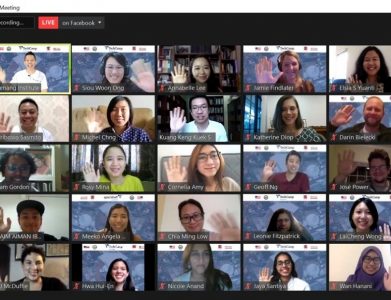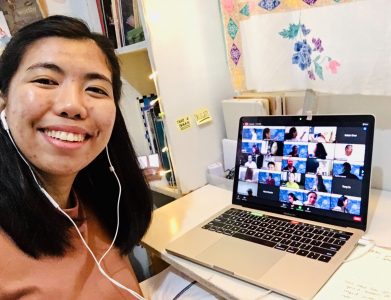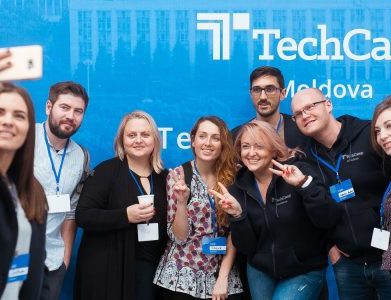Amid a pandemic, the virtual world became a lifeline, connecting individuals from around the globe. In this digital realm, Lai Cheng Wong and I crossed paths as participants in the groundbreaking TechCamp Malaysia 2020. Lai Cheng is from Malaysia, and I am from the Philippines. Despite the miles that separated us, we were determined to propose a project that would have a multiplier effect.
Guided by the experienced mentors at TechCamp, we secured a funded alumni project in 2021 to organize a three-day TechCamp Malaysia-Philippines. This event brought together teachers, educators, and experts from Indonesia, Thailand, Malaysia, the Philippines, the Netherlands, Spain, and the United States, fostering collaboration and knowledge exchange on media and information literacy (MIL) practices.
Building on this momentum, we established the MIL for MY-PH Network, a social network that connected MIL advocates from Malaysia and the Philippines. That same year, we were honored to become members of the UNESCO Media and Information Literacy Alliance. This membership allowed us to collaborate with international experts, enriching our work and amplifying our impact.
As we delved deeper into our advocacy, we transformed the evaluation report of our webinar into a research paper. We proudly presented this paper at the International Expert Conference on Audience Media and Information Literacy in collaboration with UNESCO, Paris, and the UNESCO Office in Rabat, Morocco. This prestigious event, organized by the Moulay Ismail University of Meknes in Morocco, showcased our dedication to advancing MIL globally. Furthermore, we had the honor of presenting the same paper at the Philippine Association of Communication Educators (PACE) Conference, further amplifying the importance of MIL within our region.
Building on the solid foundation we had established, we expanded the MIL for MY-PH Network to engage members from other Southeast Asian countries. We recognized the need for a broader collective, so we rebranded the network to MIL for ASEAN Network in April 2022.
The fresh funding from the U.S. State Department, through the Alumni Engagement Innovation Fund (AEIF) 2022, allowed us to forge partnerships with organizations such as Kampuchea Action to Promote Education (KAPE) in Cambodia, SEAMEO Regional Open Learning Center (SEAMOLEC) in Indonesia, Rangsit University in Thailand, Centro Escolar University (CEU) in the Philippines, and Polytechnic University of the Philippines (PUP).
And here is where our journey comes full circle. After months of virtual collaboration and countless webinars dedicated to empowering teachers and educators, Lai Cheng and I finally had the opportunity to meet in person to implement the ASEAN Teachers BootCamp in February 2023. The Philippines served as the host country, providing the ideal backdrop for our joint efforts to equip educators with the necessary skills and knowledge to navigate the complex world of media and information.
Our unwavering commitment to MIL yielded remarkable results as the MIL for ASEAN Network achieved an impressive feat at the 2022 Global Media and Information Literacy Awards organized by UNESCO. Securing the second-place position in this prestigious competition underscored the excellence and leadership displayed in various sectors, including education, research, policy, advocacy, media, and communication.
In 2023, I was selected to attend the virtual and in-person Hybrid Global TechCamp Reconnect Nepal, which marked another exciting chapter in my journey as a TechCamp alumna. The virtual run provided a platform for exploring the intersection of technology and public health, and how we can leverage tools like artificial intelligence to combat the spread of false information and improve health outcomes around the world.
Meanwhile, the in-person event in Kathmandu brought together over 50 regional participants who shared common issues and experiences related to false information, highlighting the need for a global approach to tackle the problem. As a communication scholar and media literacy advocate, I believe that my expertise, along with other regional advocates, can help shape solutions to this issue. However, it is crucial that we act collectively and urgently to develop effective strategies for promoting media literacy and combating false information on a global scale.
Despite the serious nature of the event, the in-person session was also memorable for me in other ways. I immersed myself in Nepali culture by trying traditional foods, learning about customs, and interacting with locals, which helped me gain a deeper appreciation and understanding of a culture that was new to me. In addition, I got to celebrate my birthday with a diverse group of people from over 15 countries. The experience of having global TechCamp participants sing me a birthday song was a powerful reminder of the importance of personal connections and relationships in our professional lives.
My experience as a TechCamp alumna has been an incredible one, exemplifying the potential of virtual connections to transcend limitations and bring about meaningful change. As global alumni continue to champion media and information literacy, I remain grateful for the bonds we formed and the opportunities TechCamp provided. I am excited to see how our collective efforts will further foster collaboration and transform the lives of the communities we serve by training one teacher at a time.
This is Part Two of a two-part Blog Series featuring the progress of Melinda Quinones and Lai Cheng Wong’s Continued Engagement Small Grant project.


